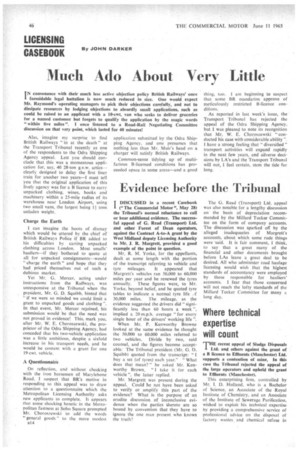Evidence before the Tribunal
Page 48

If you've noticed an error in this article please click here to report it so we can fix it.
T DISCUSSED in a recent Casebook I (" The Commercial Motor", May 28) the Tribunal's normal reluctance to call or hear additional evidence. The successful appeal of G. Read (Transport) Ltd. and other Forest of Dean operators, against the Contract A-to-A grant by the West Midland deputy Licensing Authority to Mr. J. R. Margrett, provided a good example of the point in question.
Mr. R. M. Yorke, for the appellants, dealt at some length with the portion of the transcript referring to vehicle and tyre mileages. It appeared that Margrett's vehicles ran 50,000 to 60.000 miles per year and he renewed the tyres annually. These figures were, to Mr. Yorke, beyond belief, and he quoted tyre tables to indicate a normal tyre life .1 30,000 miles. The mileage, as the evidence suggested the drivers did "significantly less than 60 hours a week implied a 20 m.p.h. average "for every single hour of the drivers' working life ".
When Mr. P. Kenworthy Browne looked at the same evidence he thought the 50,000 to 60,000 miles referred to two vehicles. Divide by two, said counsel, and the figures become acceptable: The Tribunal president (Mr. G. D. Squibb) quoted from the transcript: " I buy a set (of tyres) each year." "What does that mean?" he asked Mr. Kenworthy Brown. "1 take it for each vehicle", the latter replied.
Mr. Margrett was present during the appeal. Could he not have been asked to verify or amplify this part of the evidence? What is the purpose of an erudite discussion of inconclusive evidence when the parties thereto are so bound by convention that they have to ignore the one man present who knows the truth'? The G. Read (Transport) Ltd. appeal was also notable for a lengthy discussion on the basis of depreciation recommended by the Millard Tucker Committee on the form of company accounts. The discussion was sparked off by the alleged inadequacies of Margrett's accounts, about which some rude things were said. It is fair comment, I think, to say that a great many of the financial and other documents brought before LAs leave a great deal to be desired. All who administer road haulage licensing would wish that the highest standards of accountancy were employed by those responsible for hauliers' accounts. I fear that those concerned will not reach the lofty standards of the Millard Tucker Committee for many a long day.




























































































































